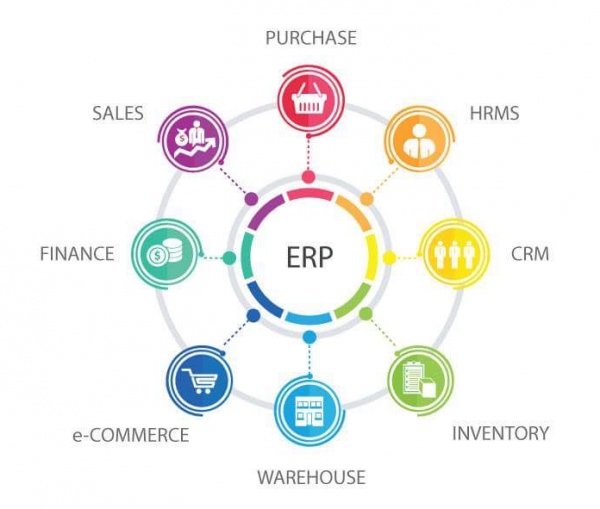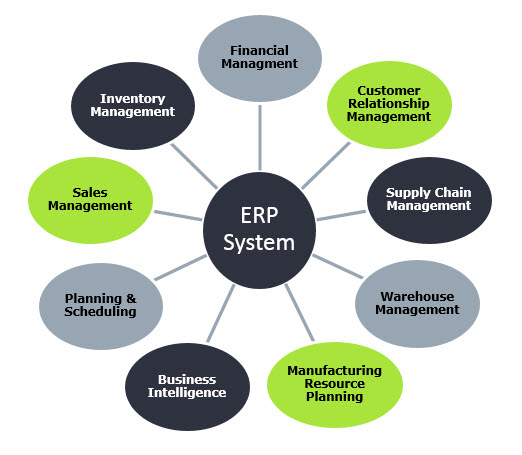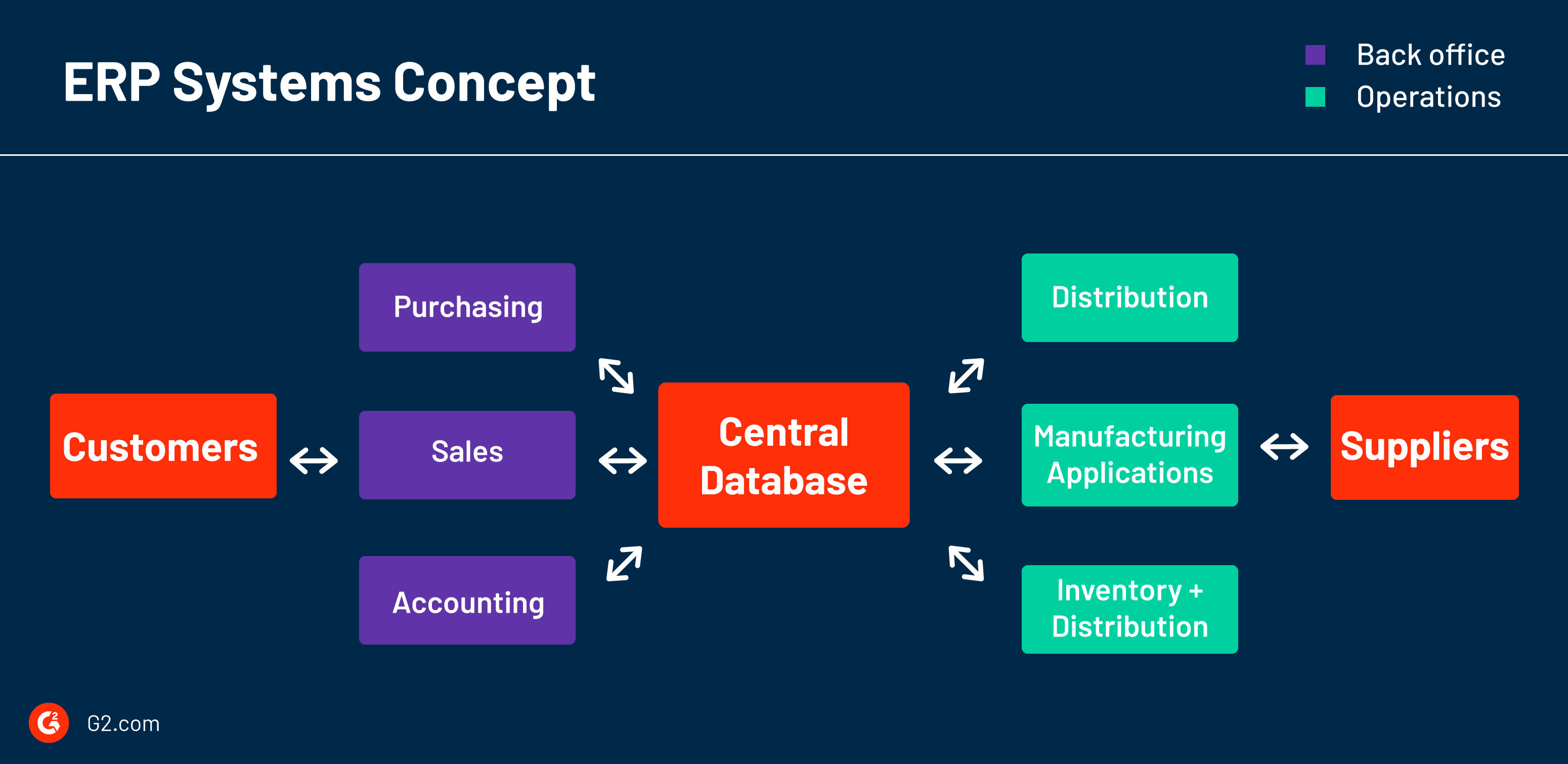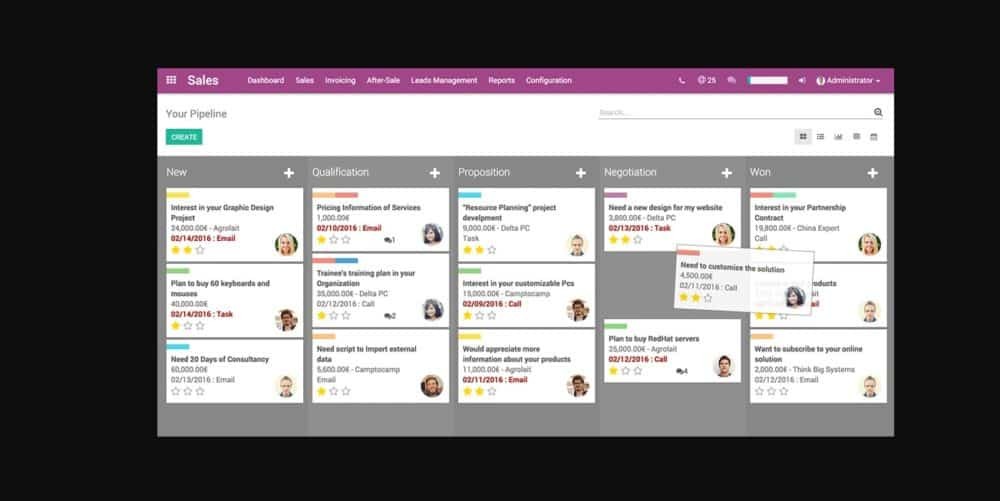Enterprise Resource Planning (ERP) software helps businesses manage various functions. It integrates processes into a single system.
ERP software works by centralizing data. This makes it easier to access information across departments. Imagine having one hub for all your business needs. From finance to human resources, ERP covers it all. The software streamlines operations, reduces manual work, and improves efficiency.
It connects different parts of your business. This creates a smooth flow of information. Understanding how ERP software works can transform how you manage tasks. It’s not just for large corporations. Small and medium-sized businesses benefit too. Stay tuned as we dive deeper into the workings of ERP software. Discover how it can make your business operations seamless and more productive.

Credit: ehopper.com
Introduction To Erp Software
ERP stands for Enterprise Resource Planning. It is a type of software. Companies use it to manage daily activities. Examples include accounting, procurement, project management, and supply chain operations. ERP software integrates these processes into one system. This allows easy sharing of information. It helps employees make better decisions. It also improves efficiency and productivity.
ERP software is very important for businesses today. It helps in streamlining operations. This reduces costs and improves efficiency. ERP provides real-time data. This helps in quick decision-making. It also enhances communication within the company. Employees can access important information easily. This results in better collaboration. ERP software also improves customer service. It provides accurate information quickly. This makes customers happy and loyal.
Core Components Of Erp Systems
ERP systems include many modules. These modules help different parts of a business. Common modules are finance, human resources, and inventory. Each module has a special job. The finance module tracks money. The HR module manages employee data. The inventory module keeps track of products. These modules work together to help the business run smoothly.
ERP systems can connect with other software. This is called integration. Integration allows data to flow easily. No need to enter the same data twice. This saves time and reduces mistakes. For example, sales data can update inventory automatically. Integration makes the system more efficient.
Data Management In Erp
ERP software stores all data in one place. This makes it easy to access. Users do not need to search in many places. Data is safe and secure. It helps in reducing errors. It also saves time. Central storage allows better decision making. Everyone can see the same data. This avoids confusion and mistakes.
ERP software processes data in real-time. This means data is updated instantly. You get the latest information always. This helps in quick decisions. No need to wait for updates. Real-time data helps in improving efficiency. It makes the business run smoothly. Users can trust the data they see. It is always up-to-date.
Business Process Automation
ERP software helps automate workflows. It connects different parts of a business. Tasks move smoothly from one person to another. This reduces errors and delays. Important steps are not missed. This makes the process faster and more efficient.
Manual tasks can be slow and error-prone. ERP software takes over many of these tasks. Data entry, reports, and scheduling are automated. This frees up time for workers. They can focus on more important tasks. The business runs more smoothly.
Customization And Scalability
ERP software can be shaped to fit any business. Customizable features let companies choose what they need. This makes the system unique to each business. Flexible options ensure every function matches the company’s work. This means no two ERP setups are alike.
ERP software grows as the business grows. Scalability means it can handle more data and users over time. New features can be added without hassle. This helps the business scale smoothly. Upgrades keep the software current and efficient.
Erp System Implementation
ERP software integrates various business processes into one system. It manages tasks like accounting, inventory, and human resources efficiently. This system ensures smoother workflow and better data accuracy.
Planning And Strategy
Careful planning is key. First, understand your business needs. Then choose the right ERP software. Involve key stakeholders. Set clear goals. Create a detailed plan. Allocate resources wisely. Assign roles and responsibilities. Establish a timeline. Monitor progress regularly. Adjust as needed. A good strategy ensures a smooth implementation.
Training And Support
Training is vital for success. Provide hands-on sessions. Use simple language. Make training materials accessible. Offer ongoing support. Address questions promptly. Encourage feedback. Keep users engaged. Regular updates are crucial. Ensure technical support is available. Proper training and support lead to effective use of ERP software.
Security Features In Erp
ERP software keeps data safe. It uses encryption to protect information. Only authorized users can see the data. This prevents data breaches. Regular updates keep the system secure. Strong firewalls block unauthorized access. Data backup ensures safety in case of system failure. These features help maintain data integrity.
ERP software manages who can access what. User roles are defined. Each role has specific permissions. Only certain users can edit data. Others may only view it. This prevents unauthorized changes. Auditing tracks user activity. This ensures users follow the rules. Role-based access keeps data secure and accurate.
Evaluating Erp Performance
Tracking key performance metrics is vital. These metrics help in understanding how well the ERP system works. Common metrics include system uptime, response time, and user satisfaction. High uptime ensures the system is reliable. Quick response time means tasks are done fast. Happy users show the system is user-friendly.
ERP systems need regular updates. These updates fix bugs and add new features. Feedback from users helps in making improvements. Training sessions can help users get the most out of the system. Always aim for better performance and user satisfaction. Small changes can lead to big improvements.
Future Trends In Erp
AI and machine learning are changing ERP systems. These tools help make better decisions. They look at data and find patterns. This helps businesses plan better. AI can also predict problems before they happen. This saves time and money. Machine learning helps in improving workflows. It learns from past actions and suggests better ways to work.
Cloud-based ERP solutions are becoming very popular. They are easy to use and manage. They allow access from anywhere with the internet. This means employees can work from home or on the go. Cloud ERP systems are also cheaper. They do not need expensive hardware. Updates are automatic, keeping the system always up-to-date. Security is strong with cloud ERP. Data is safe and backed up.

Credit: www.vnmtsolutions.com

Credit: www.g2.com
Frequently Asked Questions
What Is Erp Software?
ERP software is a system that integrates various business processes. It provides a centralized platform for managing resources, data, and operations efficiently.
How Does Erp Software Improve Efficiency?
ERP software automates repetitive tasks and streamlines workflows. This reduces manual work, minimizes errors, and enhances productivity across different departments.
Can Erp Software Be Customized?
Yes, ERP software can be customized to meet specific business needs. It allows for tailored modules and features to fit unique operational requirements.
What Industries Use Erp Software?
ERP software is used in various industries including manufacturing, retail, healthcare, and finance. It helps manage and optimize complex business processes in these sectors.
Conclusion
ERP software streamlines business processes effectively. It integrates all departments seamlessly. This unified system enhances productivity and decision-making. Businesses can track data in real-time. This leads to better resource management. It also reduces operational costs significantly. ERP software adapts to different business needs.
Implementing ERP can be a wise investment. It ultimately drives business growth. Consider ERP for optimizing your operations.



